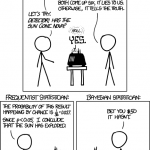attribution
Three statisticians go hunting for rabbit. They see a rabbit. The first statistician fires and misses, her bullet striking the ground below the beast. The second statistician fires and misses, their bullet striking a branch above the lagomorph. The third statistician, a lazy frequentist, says, "We got it!"
OK, that joke was not 1/5th as funny as any of XKCD's excellent jabs at the frequentist-bayesian debate, but hopefully this will warm you up for a somewhat technical discussion on how to decide if observations about the weather are at all explainable with reference to climate change.
[…
Judith Curry is now blogging, which is probably a good thing, because now instead of nitpicking other people's blogs she is now attempting to say what she thinks. Unfortunately this results in some very strange things. In doubt she appears to believe that, over the next century, natural variablity is as likely to dominate as anthro forcing, and that uncertainty about this is as big as the two put together. Bart can't make sense of that eany more than I can. She doesn't seem to make any attempt to tie her opinion to published research, either.
But this post is about her take on the Pakistan…
There's an interesting tweet about attribution in the data web. And it raises a tension I run into a lot but haven't seen a lot written about: the shifting nature of what the word "attribution" means.
We have a fairly common understanding of attribution in our daily lives: credit where credit is due is mine, and it tends to be what most people think. This is whether one is a musician, a scientist, a teacher, or anyone who does creative or innovative work. We like getting credit for our work. No problem there.
This idea of attribution encompasses the idea that we should get credit for our…
This is just one of dozens of responses to common climate change denial arguments, which can all be found at How to Talk to a Climate Sceptic.
Objection:
Climate science can't even fully explain why the climate did what it did in the past. How can they then claim they know what is going on today?
Answer:
There are two requirements for understanding what happened at a particular climate change in geological history. One is an internally consistent theory based on physical principles and the other is sufficient data to determine the physical properties involved. It is very hard, in some…
